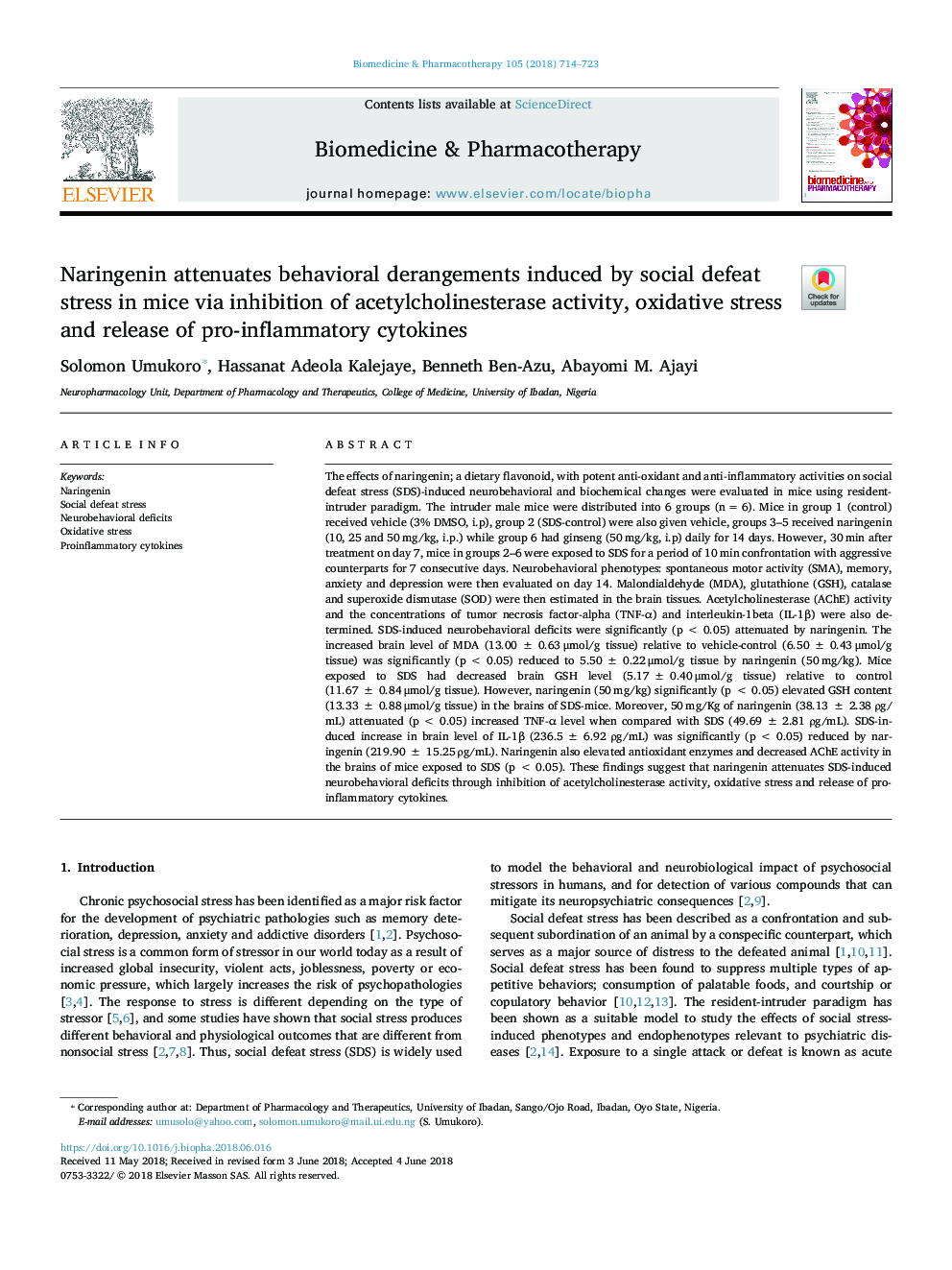| کد مقاله | کد نشریه | سال انتشار | مقاله انگلیسی | نسخه تمام متن |
|---|---|---|---|---|
| 8525246 | 1557937 | 2018 | 10 صفحه PDF | دانلود رایگان |
عنوان انگلیسی مقاله ISI
Naringenin attenuates behavioral derangements induced by social defeat stress in mice via inhibition of acetylcholinesterase activity, oxidative stress and release of pro-inflammatory cytokines
ترجمه فارسی عنوان
نایرینگینین موجب کاهش اختلالات رفتاری ناشی از استرس شکست اجتماعی در موش ها می شود از طریق مهار فعالیت استیل کولین استراز، استرس اکسیداتیو و انتشار سیتوکین های التهابی
دانلود مقاله + سفارش ترجمه
دانلود مقاله ISI انگلیسی
رایگان برای ایرانیان
کلمات کلیدی
نایرینگینین، استرس شکست اجتماعی، نقص عصبی رفتاری، استرس اکسیداتیو، سیتوکین های پروتئین التهابی
موضوعات مرتبط
علوم پزشکی و سلامت
پزشکی و دندانپزشکی
تومور شناسی
چکیده انگلیسی
The effects of naringenin; a dietary flavonoid, with potent anti-oxidant and anti-inflammatory activities on social defeat stress (SDS)-induced neurobehavioral and biochemical changes were evaluated in mice using resident-intruder paradigm. The intruder male mice were distributed into 6 groups (nâ¯=â¯6). Mice in group 1 (control) received vehicle (3% DMSO, i.p), group 2 (SDS-control) were also given vehicle, groups 3-5 received naringenin (10, 25 and 50â¯mg/kg, i.p.) while group 6 had ginseng (50â¯mg/kg, i.p) daily for 14 days. However, 30â¯min after treatment on day 7, mice in groups 2-6 were exposed to SDS for a period of 10â¯min confrontation with aggressive counterparts for 7 consecutive days. Neurobehavioral phenotypes: spontaneous motor activity (SMA), memory, anxiety and depression were then evaluated on day 14. Malondialdehyde (MDA), glutathione (GSH), catalase and superoxide dismutase (SOD) were then estimated in the brain tissues. Acetylcholinesterase (AChE) activity and the concentrations of tumor necrosis factor-alpha (TNF-α) and interleukin-1beta (IL-1β) were also determined. SDS-induced neurobehavioral deficits were significantly (pâ¯<â¯0.05) attenuated by naringenin. The increased brain level of MDA (13.00â¯Â±â¯0.63â¯Î¼mol/g tissue) relative to vehicle-control (6.50â¯Â±â¯0.43â¯Î¼mol/g tissue) was significantly (pâ¯<â¯0.05) reduced to 5.50â¯Â±â¯0.22â¯Î¼mol/g tissue by naringenin (50â¯mg/kg). Mice exposed to SDS had decreased brain GSH level (5.17â¯Â±â¯0.40â¯Î¼mol/g tissue) relative to control (11.67â¯Â±â¯0.84â¯Î¼mol/g tissue). However, naringenin (50â¯mg/kg) significantly (pâ¯<â¯0.05) elevated GSH content (13.33â¯Â±â¯0.88â¯Î¼mol/g tissue) in the brains of SDS-mice. Moreover, 50â¯mg/Kg of naringenin (38.13â¯Â±â¯2.38 Ïg/mL) attenuated (pâ¯<â¯0.05) increased TNF-α level when compared with SDS (49.69â¯Â±â¯2.81 Ïg/mL). SDS-induced increase in brain level of IL-1β (236.5â¯Â±â¯6.92 Ïg/mL) was significantly (pâ¯<â¯0.05) reduced by naringenin (219.90â¯Â±â¯15.25 Ïg/mL). Naringenin also elevated antioxidant enzymes and decreased AChE activity in the brains of mice exposed to SDS (pâ¯<â¯0.05). These findings suggest that naringenin attenuates SDS-induced neurobehavioral deficits through inhibition of acetylcholinesterase activity, oxidative stress and release of pro-inflammatory cytokines.
ناشر
Database: Elsevier - ScienceDirect (ساینس دایرکت)
Journal: Biomedicine & Pharmacotherapy - Volume 105, September 2018, Pages 714-723
Journal: Biomedicine & Pharmacotherapy - Volume 105, September 2018, Pages 714-723
نویسندگان
Solomon Umukoro, Hassanat Adeola Kalejaye, Benneth Ben-Azu, Abayomi M. Ajayi,
